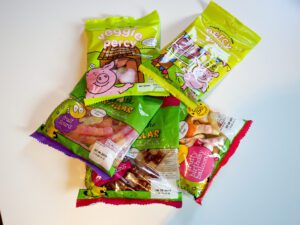Percy Pig’s American dream under threat as M&S responds to Trump tariffs and HFSS rules

Marks & Spencer’s beloved Percy Pig sweets have just landed in Target stores across the US, but their American adventure may be cut short amid concerns over President Trump’s new 10% import tariffs on UK goods.
Archie Norman, chair of M&S, told the Retail Technology Show in London this week that the retailer was reassessing the impact of the new trade barriers on its ambitious US expansion. “We might have to change our minds,” he said. “Tariffs could push up prices and make [Percy Pig] less popular.”
Described by Norman as M&S’s “gift to America”, Percy Pig officially launched in the US on 30 March in what the retailer called the brand’s “biggest journey to date.” But while there are no immediate plans to withdraw the product, higher costs from tariffs could challenge competitiveness — a particular concern for confectionery lines in a crowded and price-sensitive market.
The move comes as part of President Trump’s broader announcement of sweeping new tariffs, including a blanket 10% duty on all UK imports, fuelling worries among British exporters across multiple sectors.
Festive marketing rethink amid HFSS restrictions
Norman also revealed that M&S is rethinking its 2025 Christmas advertising campaign, in response to the UK government’s incoming ban on HFSS (high fat, salt and sugar) food ads before 9pm, which is due to come into force in October 2025. “It probably means we can’t run our Christmas ad,” Norman said. “You won’t be able to run an ad that includes Christmas pudding, your mince pies or sausages.”
He suggested the regulation, aimed at tackling childhood obesity, could force retailers to make substantial changes to their festive marketing strategies, particularly those centred around traditional seasonal foods.
While M&S’s clothing and homewares ranges will remain unaffected by the rules, food-focused campaigns will likely need to be heavily adapted — either restricted to post-watershed slots or edited to exclude HFSS items. “There could be the equivalent of a traditional ad which can only run before the watershed or one that doesn’t feature mince pies [that could run at any time],” Norman said, hinting at a more complex creative process for 2025.
Regulatory headwinds and retail strategy
Norman, a former Conservative MP, warned that the retail sector faces a wave of regulation — from packaging and sustainability requirements to labour standards — which could hit smaller businesses particularly hard. “M&S will manage with everything as we are a growing business with no debt,” he said, “but for the little guy these things become really damaging. It’s going to be tough for some people.”
He also cast doubt on the profitability of fast grocery delivery and loyalty pricing models. “Online food retail is a desert of profit,” he said — albeit acknowledging this was “an exaggeration” — and cited vast private equity losses in companies like Gorillas.
Instead, M&S will focus its Sparks loyalty scheme on personalised engagement rather than discounts for cardholders, which Norman dismissed as offering little long-term value.
While M&S remains confident in the long-term outlook for its joint venture with Ocado, the remarks highlight a broader scepticism about the economics of online food retail and rapid delivery models.




